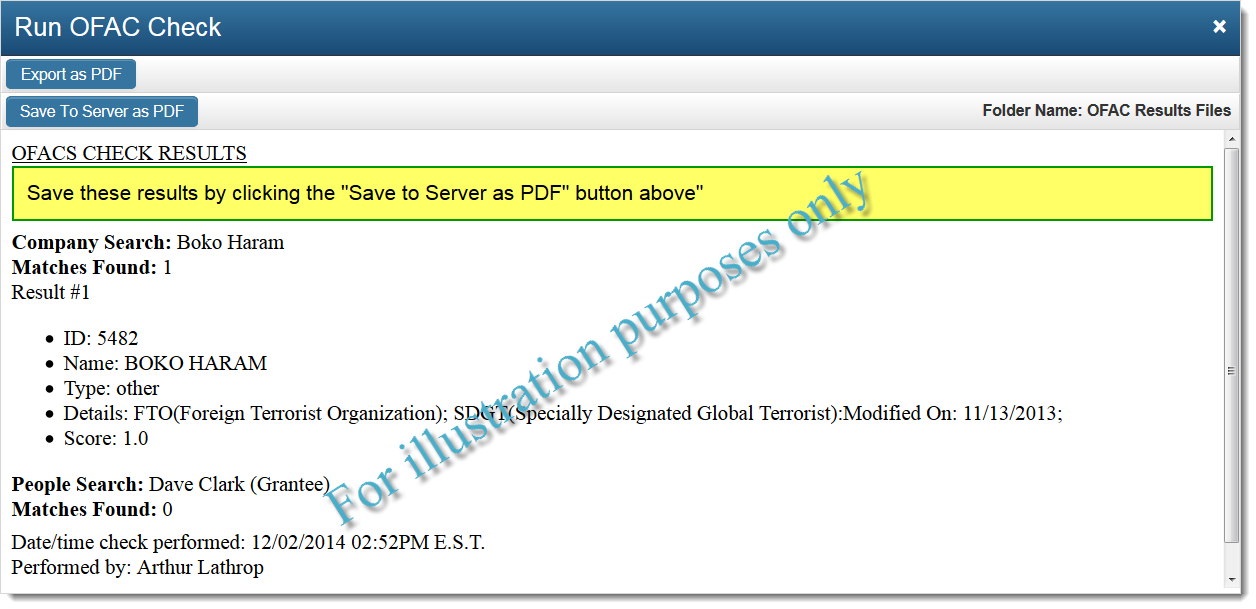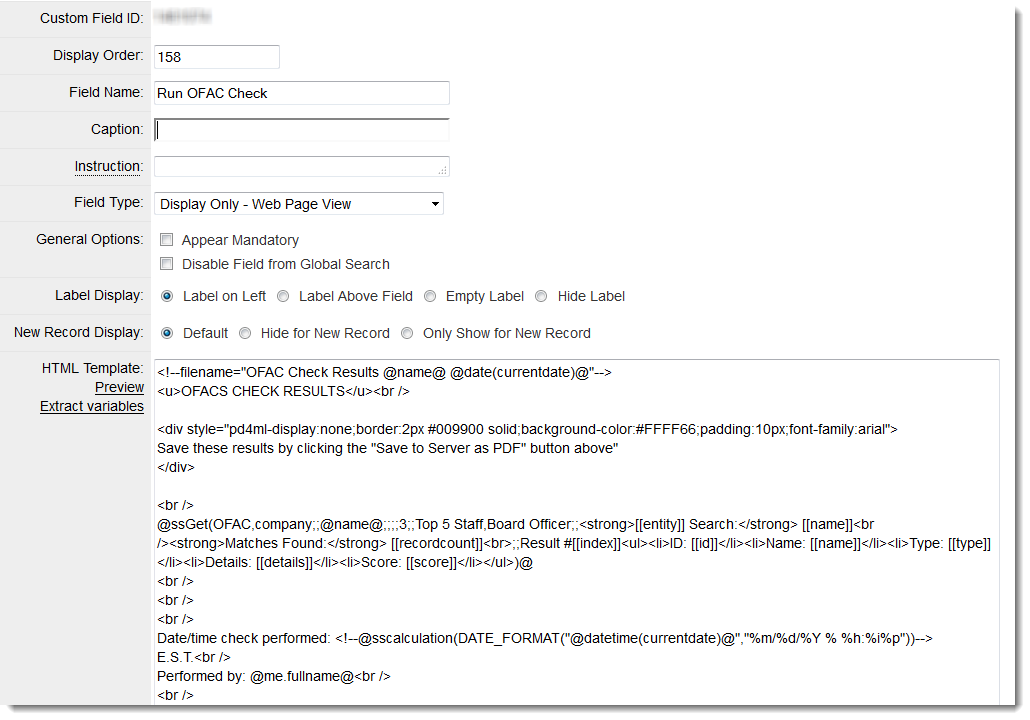Difference between revisions of "SsGet"
| Line 67: | Line 67: | ||
</pre> | </pre> | ||
| − | |||
| − | |||
| − | + | {{Template:Watchlist}} | |
| − | |||
| − | |||
| − | |||
| − | |||
| − | |||
| − | |||
| − | |||
| − | |||
| − | |||
| − | |||
| − | |||
| − | |||
| − | |||
| − | |||
| − | |||
| − | |||
| − | |||
| − | |||
| − | |||
| − | |||
| − | |||
| − | |||
| − | |||
| − | |||
| − | |||
| − | |||
| − | |||
| − | |||
| − | |||
| − | |||
| − | |||
| − | |||
| − | |||
| − | |||
| − | |||
| − | |||
| − | |||
| − | |||
| − | |||
| − | |||
==Returning information from the online U.S. Census database== | ==Returning information from the online U.S. Census database== | ||
Revision as of 14:40, 13 March 2018
The ssGet variable is used to extract information from databases, including the OFAC (Office of Foreign Assets Control) database, U.S. census data and Janus, SmartSimple’s Machine Learning tool.
The syntax for the ssGet variable varies by the database from which information is being returned.
Returning information from the Office of Foreign Assets Control (OFAC)
On-request checks can be made against the OFAC's online database within SmartSimple. For example, on an organization profile, a button can be configured that exposes the following check results:

In the above illustration, the OFAC check has returned one 100% match result on the company name, and no results on the attached contacts.
The syntax for configuring the OFAC check is as follows:
- @ssGet(OFAC,entity;;firstname;;lastname;;search options;;roleslist;;meta template;;line template)@
The arguments are as follows:
- entity: accepts "people", "company" or "all"
- firstname: an individual's first name or company name
- lastname: an individual's last name (will be ignored if entity is "company" or "all")
- search options: accepts "1", "2" or "3"
- 1 - search current object only (when "entity" is set to "people" or "company")
- 2 - search people underneath (when "entity" is set to "company" only)
- 3 - search current object and people underneath (when "entity" is set to "company" only)
- roleslist: applies if "search options" is set to "2" or "3". Should be in format of comma-delimited role ids or role names (but not ids mixed with names).
- meta template: Template of how "header" of results will be returned. Default template will be used if empty
- variables that can be used include:
- [[entity]] - search type
- [[name]] - name of search result
- [[recordcount]] - number of records returned by OFAC search
- [[now]] - Current date
Example: "Search type : [[entity]] , Search for : [[name]], Records returned : [[recordcount]], Date :[[now]]"
- line template: Template of how "body" of results will be returned. Default template will be used if empty
- variables that can be used include:
- [[index]] - index number
- [[id]] - OFAC ID for result
- [[name]] - OFAC name for result
- [[type]] - OFAC type for result
- [[alias]] - other aliases used
- [[details]] - returns OFAC designation for entity returned, including date updated in OFAC database
- [[score]] - percentage score of result match (for example, in the above example, the "company name" Boko Haram returned a 100% match. An organization with the name Bozo Haram will return an 88.9% match with Boko Haram.
Example:[[index]][[id]][[name]][[type]][[details]][[score]]
The following is an example of the configuration of the above display:
<!--filename="OFAC Check Results @name@ @date(currentdate)@"--> <span style="text-decoration: underline;">OFACS CHECK RESULTS</span>
<br /> @ssGet(OFAC,company;;@name@;;;;3;;Top 5 Staff,Board Officer;;<strong>[[entity]] Search:</strong> [[name]]<br /><strong>Matches Found:</strong> [[recordcount]]<br />;;Result #[[index]]
)@
<br />
<br />
<br />
Date/time check performed: <!--@sscalculation(DATE_FORMAT("@datetime(currentdate)@","%m/%d/%Y % %h:%i%p"))--> E.S.T.<br />
Performed by: @me.fullname@<br />
<br />
Watchlist
SmartSimple, in partnership with our Watch List providers (CSI Web or Lexis Nexis) can provide access to more 3rd party services lists than simply the OFAC list, although the client must pay for this service through an agreement with one of the two integrated providers.
Watch List setting are found in Global Settings, under the Integrations tab.
The settings provide people the ability to enter their own billing id and password for the third party service you are utilizing.
When utilizing CSI Web, there are settings within the Integrations tab to defined the watch list you wish to search against, and the scan threshold, which will dictate only being shown results that match or exceed the threshold.
The list of supported 3rd party services with CSI Web includes . . .
- U.S. Bureau Of Industry and Security
- Department of State - Bureau of International Security & *Nonproliferation list
- Department of State - Defense Trade Controls Debarred Parties list
- International Criminal Police Organization (INTERPOL)
- Politically Exposed Persons, CIA Foreign Officials
- Office of Inspector General
- Excluded Parties List System provided by the General Services Administration (GSA)
- Financial Crimes Enforcement Network
- FinCEN Money Services Business
- World Bank Ineligible Firms
- Terrorist Exclusion List
- FBI Most Wanted Fugitives
To check values stored as text, rather than actual Organization or Contact records then use $$ssGet(...)$$ instead of @ssGet(...)@. The following syntax example includes a list of Board Directors stored as XML data in a field named Board of Directors:
When utilizing Lexis Nexis, the settings for which watch list services will be included, along with threshold settings, will be managed within your Lexis Nexis account and not within SmartSimple.
Returning information from Watchlist
The syntax for configuring the Watch list check is as follows:
- @ssGet(ServiceName,entity;;firstname;;lastname;;search options;;roleslist;;meta template;;line template)@
The ServiceName is dependent on which third party service you are utilizing:
- CSI Web: WatchList
- Lexis Nexis: LexisNexis
The line template portion of the syntax allows you to include unique values and parameters in the scan criteria, such as date of birth or country. These values and the variables that correspond to them are unique to CSI Web and Lexis Nexis and will require reviewing the individual service provider's fields and available options.
@parent.client.xml.Board of Directors XML.boardDirectors.boardDirectorsAdd[#$ssGet(WatchList,company;;owner;;;;3;;Grant Seeker,Executive Director,Board Member;; <strong>Board Member Search:</strong> ~Name.nodevalue~<br />Matches Found: [[recordcount]];;
| Result | ID | Name | Type | Alias | Details | Score |
|---|---|---|---|---|---|---|
| index | id | name | type | alias | details | score |
;;unparsedname=~Name.nodevalue~)$#]@<br /><br /> @ssGet(LexisNexis,people;;@firstname@;;@lastname@;;1;;;;<strong>Applicant Search:</strong> @firstname@ @lastname@<br />Matches Found: [[recordcount]];;
| Result | ID | Name | Type | Alias | Details | Score | alias | details | score |
|---|
;;)@[[index]][[id]][[name]][[type]]
Returning information from the online U.S. Census database
@ssGet(FFD,FIPS;;@address@ @city@ @state@)@
@ssGet(FFD,Profile;;year;;Address or FIPS code;;level;;[[template]])@
(See Census Integration for detailed description of syntax.)
(See List of census templates for links to full list of values for [[template]])
Returning information from Janus
@ssGet(JANUS,modelname)@
